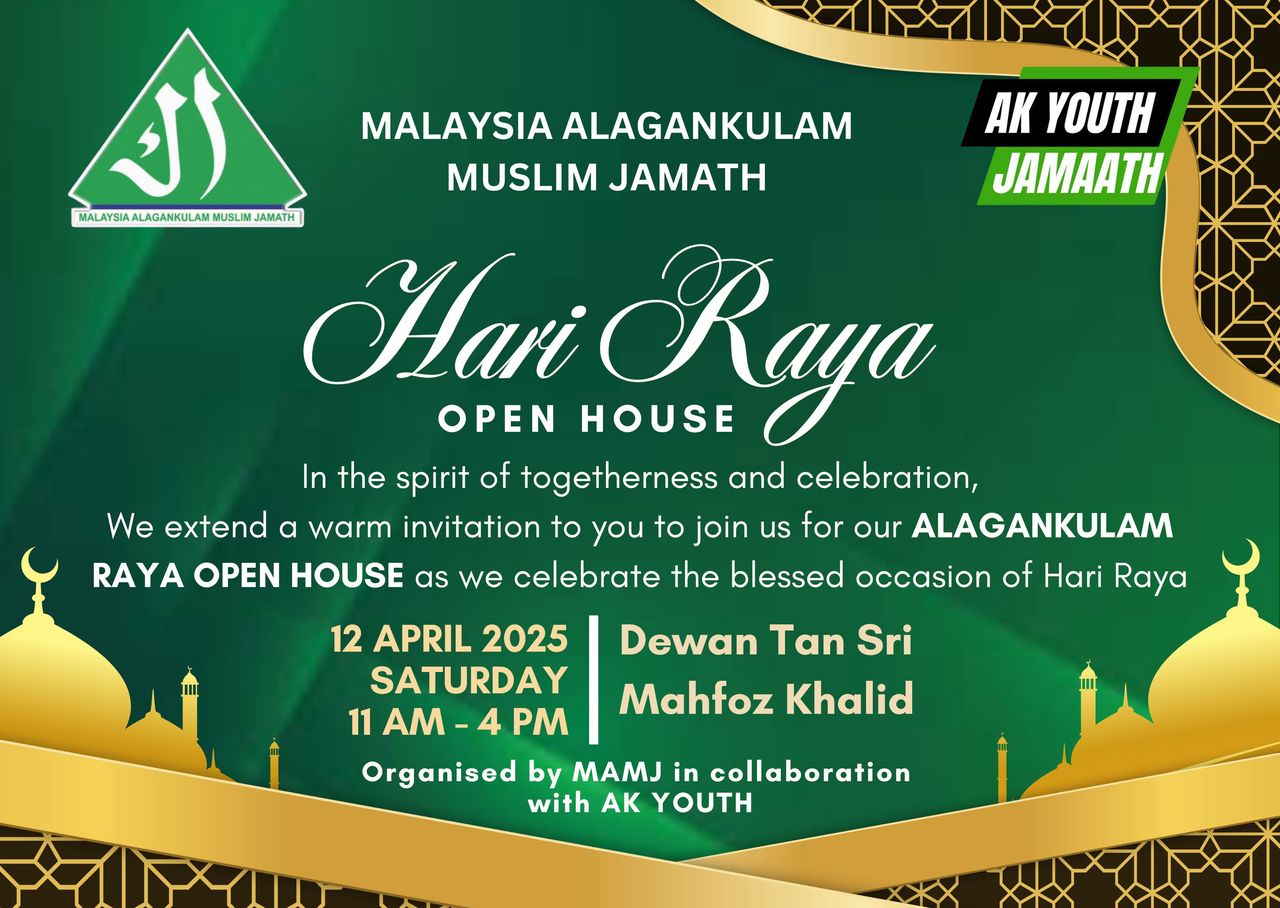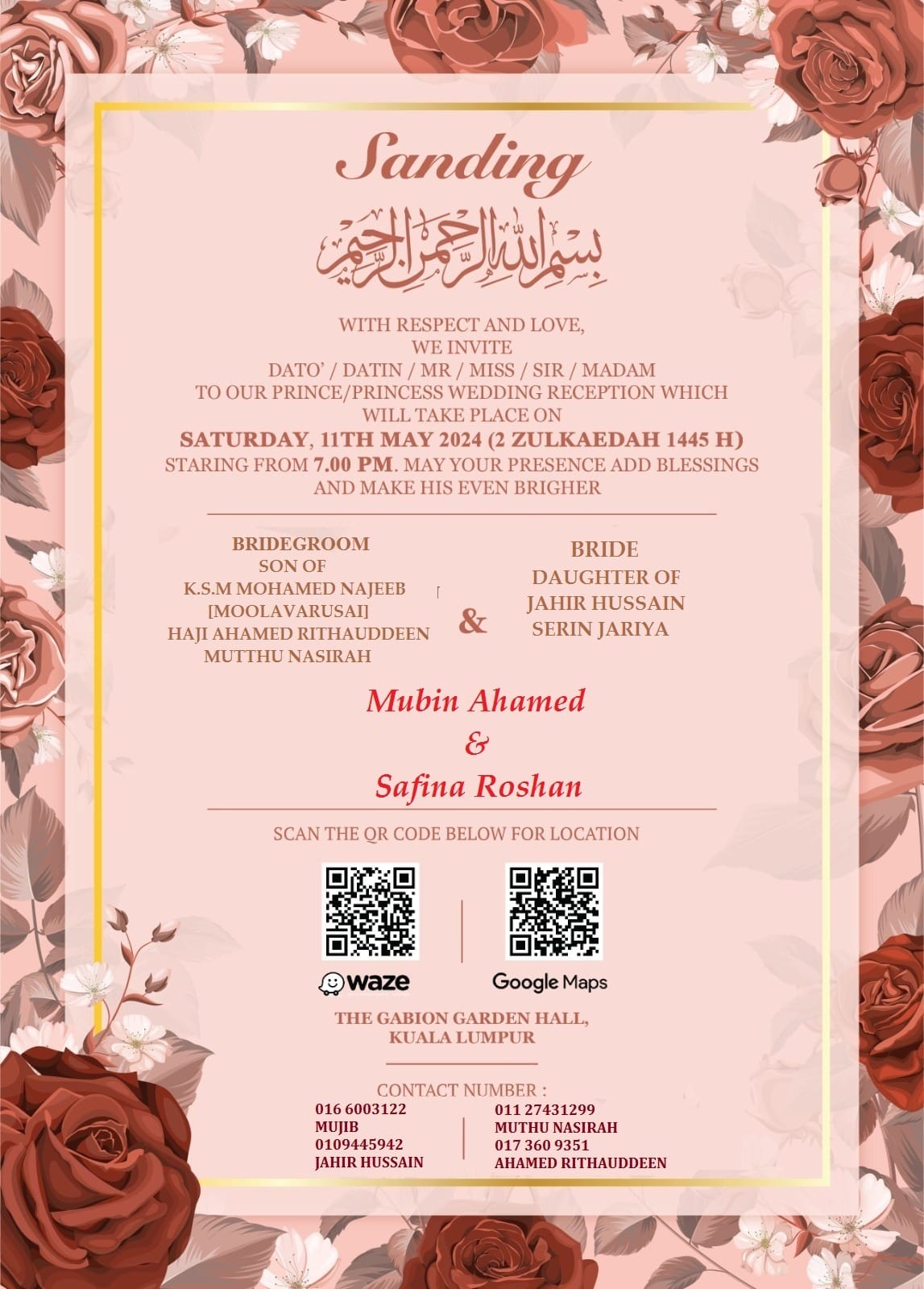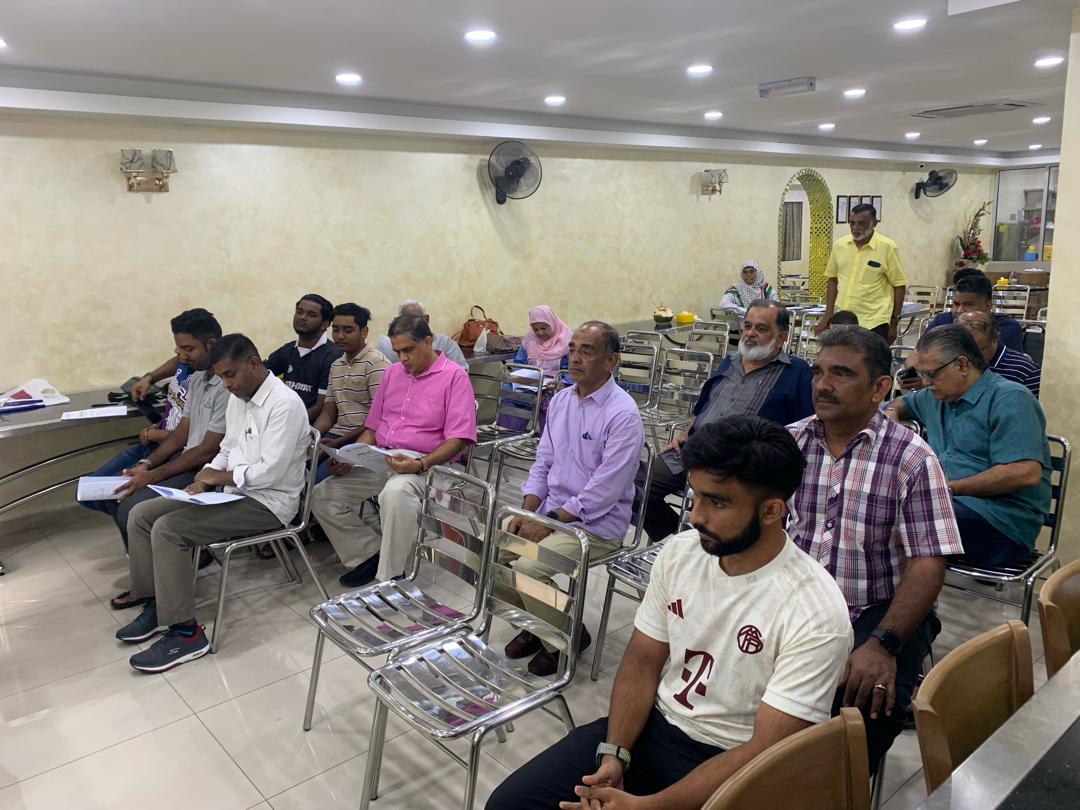The early Rawthers of Penang
- WEDDINGS & EVENTS
- The early Rawthers of Penang
The early Rawthers of Penang
Article’s origin: http://thegreatrawthers.blogspot.my/
Seeni Rawther was born in Ramnad in South India in 1882. He came to Penang at the age of 7 and returned to India at the age of 11 to learn trading from his cousin, P.K. Shakkarai Rawther. A couple of years later he returned to Penang and started his business transporting labourers from India to Penang. He imported Indian foodstuff such as flour, sugar and cooking oil to Penang. Like the other Penang traders, he exported goods from Penang and the surrounding areas to India.
Sakkarai Rawther with white beard
The Muslim community constantly turned to Tamil Muslim merchants for sponsorship of religious causes. Shakkarai Rawther and Seeni Rawther were members of the Mohamedan Advisory Board. They gave generously to mosques and Muslim schools and also sat on the board of the Al-Mashoor School. Although they acted as patrons to the larger Muslim and Malay community, they upheld their own Tamil Muslim religious identity.
P.K. Shakkarai Rawther’s contributions to Penang are many, namely he worked for a European shipping company and started his own cargo handling services. He formed P.K. Shakkarai Rawther & Co (early 1930s). Part of his land was used to build 240 kampung houses, which were offered free to the locals. P.K. Shakkarai Rawther, was a shipping contractor for British India Steam Navigation Co., Ltd. It was a venture which he operated with A.K. Seeni Rawther; K.E.A. Mohideen Kandu and Maricar & Co.. These general merchants and commission agents had their office at 43 Penang Street.
Another notable Rawthers with who I am associated with ware S.M. Mohamed Yusoff Rawther and K.K.M. Saleh Rawther. It is the later who named me as Buruhanudeen. My grandfather, Sulatn Rawther was S.M. Mohamed Yusoff Rawther’s brother. He donated money to the construction of Pykett Methodist School, which was the first primary school I attended. He was a very generous man and donated money to orphanages and old folks’ home. He was the president of the Muslim Mahajana Sabha (1930), a committee member of Al-Mashoor School, president of Darul Aihsan Football Club and a member of The Penang Mohamedan Advisory Board.
S.M. Yusoff Rawther came to Penang only in 1915. And his business was based on his stevedoring business. Large ships could not anchor directly at the Penang harbour because the sea was not deep enough. The unloading and loading business became very profitable. Indian Muslims from his village- Thinaikulam in South India and also from surrounding villages were employed and soon the villages flourished. . These workers were fondly called, ‘Mamak Tongkang’. Tongkang refers to the lighters, which were used to transport goods unloaded from ships to the port.
S.M. Mohamed Yusoff Rawther and Saleh Rawthers were successful and leading shipping chandlers, stevedores and boat owners. Their offices still stand at 127, Lebuh Kapitan Keling and 54, Lebuh Queen in Penang.
Son of S.M. Yusoff Rawther. A respected, successful businessman. Former Penang municipal councillor, NGO activist, present President of CAP.
Another thriving Indian Muslim business at that time was the Penang famous, ‘Nasi Kandar’. One of the earliest entrepreneurs was M. Mohamed Thamby Rawther and his sons N.M. Seeni Packeer Rawther, N.M.Packeer Mohamed Rawther and Abdul Ghani Packeer Rawther. He started his nasi kandar business in the 1860’s. He sold his cooked rice and other assortments to go with the rice in two large rattan baskets hung on both ends of a pole. He carried the pole on his shoulder balancing the two containers, one in the front and the other at the back. Hence the word, ‘kandar’, the Malay word meaning to carry heavy materials on one’s shoulder. Together with his three sons he plied the streets along Dato Koya Road, Penang Road, Prangin Road, Pitt Street and sometimes they went as far as Tanjung Tokong with their nasi kandar. They vended their food on foot since British did not give them licences to safe guard public health.
Some of them married the local women even though they had wives in India. Many of the workers stayed in crammed conditions and had one foot in India and the other in Penang. They regularly travelled to India by ship and eventually brought their male children to Penang.
This rule was lifted after Second World War and the Rawthers stopped vending but started to sell from shops. This was the beginning of Hameediyah Restaurant at Campbell Street. It was named after Abdul Hameed. Packeer Mohamed Rawther expanded the business with other members of the family.
Even the rich Rawthers diverted their businesses in other fields. Many of their children have become doctors, lawyers, engineers and successful businessmen. As time passed with the declining business in the shipping industry due to modern technology, many of the Tongkang workers found themselves unemployed and turned to doing other businesses for survival.
Rawthers have left legacies to subsequent generations in Penang. They started trading on a small scale but their acumen and diligence made them very successful that later heightened their social prestige locally and in the vicinity.
Categories
Events
Blog Archieve
- [+] 2024 (2)
- [+] 2023 (2)
- [+] 2021 (2)
- [+] 2020 (8)
- [+] 2019 (5)
- [+] 2018 (5)
- [+] 2017 (4)
- [+] 2016 (16)
- [+] 2015 (42)
- [+] 2014 (36)
- [+] 2013 (15)
- [+] 2012 (19)
-
[+]
2011 (61)
- [+] January (7)
- [+] February (7)
- [+] March (4)
- [+] April (1)
- [+] May (5)
- [+] June (1)
- [+]
July
(8)
- Kem Ibadah Wanita Pra-Ramadhan
- Invitation to Majlis Berbuka Puasa MAMJ
- Majlis Berbuka Puasa MAMJ 2011
- Ramadhan 2011 Fund
- Another Achievement by Our Past President Haji Mohamed Ismail Sharif – He is Among the Top 50 Islamic Finance Lawyers Globally. Alhamdulillah
- பட்டமளிப்பு விழா
- Majlis Buka Puasa Amal 2011 – Anjuran Indiamuslim.org (IM.ORG) Dengan Usahasama Muslim Manaver Sanggam (MMS)
- Chess tournament
- [+]
August
(9)
- ALL RELIGIONS SAY ‘ONE’ – Part 2 (In Hinduism, Sikhism, Christianity, Judaism, Confucianism & Buddhism)
- ALL RELIGIONS SAY ‘ONE’ – Introduction
- PENYERTAAN PAS DALAM PERARAKAN BERSIH 2.0
- BAN ON RECITAL OF THE QURAN OVER LOUDSPEAKERS IN PENANG
- MY VIEW ON MARISA DEMORI’S LETTER IN NEW STRAITS TIMES
- THE ISSUE OF MURTAD (APOSTASY)
- ALAGAI PATTAMALIPPU VIZHA
- THANK YOU MAMJ MEMBERS
- RAMADHAN MUBARAKH!!!!!
- [+] September (5)
- [+] Octobar (4)
- [+] November (3)
- [+] December (7)
-
[+]
2010 (160)
- [+] January (8)
- [+] February (3)
- [+] March (1)
- [+] April (3)
- [+] June (1)
- [+]
July
(15)
- ஜோதிடம் , சகுனம் பார்த்தல் : இஸ்லாமியக் கண்ணோட்டம்
- OUR PRESIDENT AND DATIN VISIT DR.APJ ABDUL KALAM
- உம்மத்தின் வழிமுறை
- IBUBAPA
- The Key to Raising Righteous and Successful Children
- ங்கள், செலவழிக்கும் முன் சம்பாதியுங்கள்
- A New Domain Extension “.CO” Launched
- தாம்பத்திய உறவு
- கமலாதாஸ் – ஸுரையா :
- உறவுக்கு அப்பால் தாய் தந்தை
- PERIYAR DASAN’S SPEECH AT JEDDAH:PHOTOS
- பெண்ணுரிமையும்! இன்றைய பெண்களும்!!
- FAMILY VALUES : THE MOTHER
- Invitation to Program Rapat 1Malaysia
- Just See What British Thought of India and How They Managed to Rule Us
- [+]
August
(19)
- ALLAH THE GREATEST
- RAMADHAN : MONTH OF PATIENCE
- My Mother, My Best Friend
- RAMADHAN : MONTH OF PATIENCE
- Enriching the Community
- ZAKAT DISTRIBUTION
- 6-Story Jesus Statue Struck By Lightning!!!
- இல்லறமே நல்லறம்!!!
- வரதட்சணை : பூனைக்கு மணி கட்டுவது யார்?
- Dato’ Haji Thasleem and Datin Dr.Yazmeen with Dr. APJ Abdul Kalam
- அமைதியை இழந்து தவிக்கும் அமெரிக்க வீரர்கள்!
- WE ARE THE HONORABLE WOMEN OF ISLAM!
- Recent Archaeological find by Aramco During Gas Exploration in Saudi Arabia- Subhanallah
- ஒரு சகோதரியின் உலக சாதனை !
- BELOVED AMMA & ATTHA
- எதை கொடுப்பது ? எதை எடுப்பது?
- திருமணம் என்பது ஒவ்வொரு மனிதனில் வாழ்விலும் ஒரு முக்கியமான அம்சம்.
- முஸ்லிம்களுக்கு ஏன் இவ்வளவு பெருமை என்று வியந்தேன்…
- ஏன் இஸ்லாம் — ஆமினா அசில்மி
- [+]
September
(21)
- A Police Officer Wrote This! Please Read coz may Save your Life!
- Al-Quran
- APPEAL FOR LAND BY MAMJ
- History Mystery – Interesting and Incredible
- Makkah (SubahanAllah) -Current Development
- Prophet Muhammad SAW Praised by Non-Muslim Leaders and Philosophers
- Interactive Sites on Medical Information
- Indraiya Poluthu Iniya Poluthaaga Amaiyattum
- BABRI MASJID CASE -JUDGEMENT ON 24TH.SEPTEMBER 2010
- நபி மொழிகள் !!!
- The Minor Signs of the Last Day
- அல்லாஹ்விடம் உதவி தேடுங்கள்!
- Walking Helps Keep Body and Brain Young
- NY imam says mosque fight worth the controversy
- BELOVED ATTHA : YOU ARE THE BEST
- ஒரு குத்துச்சண்டை வீரரின் அழுகை!
- Ahmedabad’s Bus System a Hit with Several Countries
- Breaking News-RAMADHAN FUND 1431H
- All for a Palm Tree in Jannah
- MAMJ President at The Orphanage in Kg.Manjoi Ipoh
- MAMJ President at Buka Puasa Organised by Tanjung Muslim Association Penang in Association with Penang Hindu Sangam and Klinik Derma Sivasanta
- [+]
Octobar
(34)
- The Human Camera
- Outstanding Animations
- Best Signpost in India
- காய்கறிகள் பழங்கள் மூலமாக இருதய அடைப்பை நீக்க முடியுமா ?
- Better to be Lion Hearted!
- Peace of Mind Tips and Advice
- சில பொன்மொழிகள்..
- India’s Rare Pictures
- Home of a Mexican Drug Lord being raided!
- What is I C E ?
- Life iN the Year 3000
- GEMS OF WISDOM
- Regular Health Mistakes
- மகிழ்ச்சியாக இருப்பதற்குக் காரணங்கள் தேவை இல்லை
- Existence of Allah
- TO ALL AMMA’S : IMPORTANCE OF BREASTFEEDING
- ஆரோக்கியமாக வாழ ..
- Brain Damaging Food and Habits
- The status of the family in Islam
- Allah looks to your Heart & Deeds
- Shine a Light and enjoy your Coffee
- Be Very Careful of Rat Urine/Droppings
- THE PAST IS GONE FOREVER!!!!
- Taxi in Dubai
- Coincidental! – Good for Your Health
- ALLAHU AKHBAR!!
- The First Medical Council in The World
- Inside Ka’bah & Airmata Rasulullah SAW
- A Muslim Student in India Fights for Her Right to Dress in Islamic Way
- The Best Person in The History of Mankind
- FABULOUS COMPILATION
- ETIQUETTE OF NAMING CHILDREN
- Islam Again in Ayodya
- Interview with British Journalist Yvonne Ridley
- [+]
November
(38)
- Suhas Gopinath from Bangaluru,WORLD’S YOUNGEST CEO
- IF YOU HAVE A WILL, YOU WILL!!!!
- DISIPLIN ANAK-ANAK!!
- BE READY!!!!!!!!!!!!!
- REMEMBER! REMEMBER! REMEMBER!
- 360 DEGREE PICTURE – THE COCKPIT OF THE AIRBUS A380
- Allah takes Your Soul When You sleep
- 16 Amazing Photos that captured the world
- Be Amazed By The Beauty Of Nature
- MAMJ Presidents Speech at Masjid Muslim India Ipoh
- A Story of Appreciation
- Mirror or 2-Way Glass? BE CAREFUL
- God’s Work
- English is a Funny Language
- Hari Raya Aidiladha Wishes
- Superb Sentences By Famous People
- Dont Be Serious, Be Sincere
- Eating Fruits The Proper Way
- MUSLIM MOROCCANS LIVEHOOD
- Tony Blair’s sister-in-law Lauren Booth converts to Islam
- Success dosen’t come within a day! – MAMJ n Alagai Makkal
- பெண்
- THE SMALLEST GIRL IN THE WORLD!!!!!
- கோபம் – வேண்டவே வேண்டாம் !!!
- FED UP OF LIFE?
- SOCIAL CLASSES IN ISLAM???
- The Charles Schulz Philosophy
- ஆசைகளை சீர்படுத்துங்கள்
- ஆசைகளை முறைப்படுத்துங்கள்
- CWG 2010 Special – PHOTOGRAPHY
- Sejda Miracle
- Wedding Dates -Avoid Clash of Dates
- New Drug in Schools? Parents Please Take Note
- DEATH SENTENCE FOR A KIDNAPPER IN YEMEN
- AMAZING TRAIN ROUTES
- RICH INDIA? POOR INDIA? DO YOU BELEIVE THIS?
- One Call (ESTAWOO = Arrange yourselves) and The Impossible Happens
- To All Parents!
- [+]
December
(17)
- 14 YEARS OLD MOHAMED SUHAIL’S ACHIEVEMENTS:
- CONGRATULATIONS TO ALL MAMJ STUDENTS WHO SUCCEEDED IN PMR
- Notification of Wedding Dates
- Benefits of Drumstick leaves ( Tamil – Murungai leaves )
- Small teaser for Alagai Makkal..Enjoy!
- Niagara Falls 99 years ago. Worth Looking At
- 4 THINGS YOU PROBABLY NEVER KNEW YOUR MOBILE PHONE COULD DO
- ALAGANKULAM BIRDS SANCTUARY
- The Goodthings of HONEY
- The Ugly Briton
- The Cucumber
- Naive, Dim-wit or Extreme?
- Worth reading!
- Unconditional Love
- Muharram Message
- Muharram Greetings
- Amazing Houses Around the World – General Knowledge for Alagai Makkal
-
[+]
2009 (20)
- [+] September (2)
- [+] Octobar (3)
- [+] November (4)
- [+]
December
(11)
- Islam and Science
- Speak more in Malay -Dr. M Tells Indian Muslim
- Annual tax filing for YA 2009 – are we ready
- Divorce?! Separated!? Why?
- Wearing hijab – Compulsion, option or willingness?
- MAMJ EXCO MEET THE MEMBERS AT SUNGAI PETANI
- DINNER AND GIFT PRESENTATION TO EXCO MEMBERS 2006 – 2009
- Newspaper Clippings from India
- Eid al-Adha and Hajj 2009
- Thoughts to Share
- 2009 MAMJ Imam Al-Ghazzali Merit Awardees
- [+] 1996 (1)
- [+] 1993 (1)
- [+] 1881 (1)
-
[+]
0 (1)
Advertisement
Newsletter Sign Up
For Latest Updates




